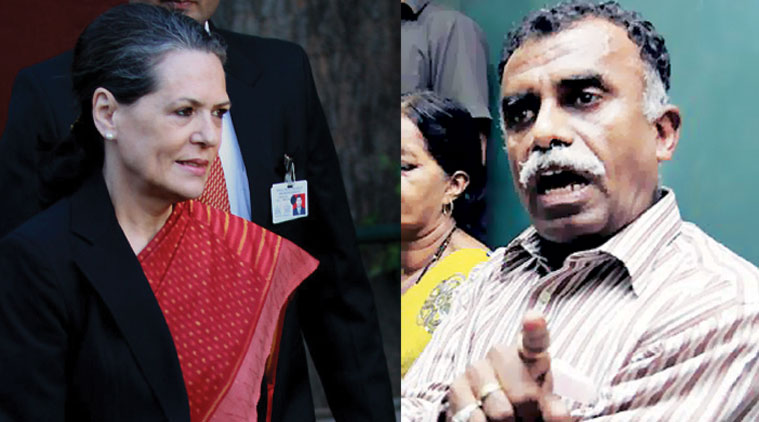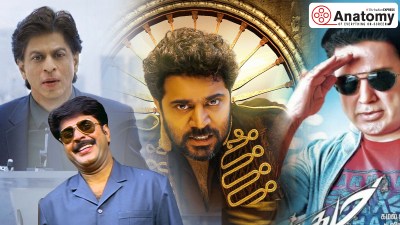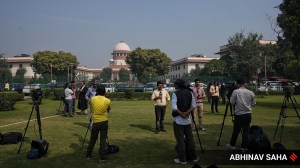- India
- International
Congress didn’t let Sonia meet Zakia Jafri after riots: 2002 ‘whistleblower’
The chief of the Gujarat Intelligence Bureau in April-September 2002, Sreekumar accuses the Congress-led UPA as well of betraying the expectations of riot victims regarding justice.
 Congress president Sonia Gandhi (L), R B Sreekumar.
Congress president Sonia Gandhi (L), R B Sreekumar.
Congress president Sonia Gandhi planned to visit Zakia Jafri, widow of former Congress MP Ehsan Jafri who was killed in the post-Godhra riots of 2002, but was prevented from doing so by party leaders, claims retired DGP R B Sreekumar, in his book Gujarat: Behind the Curtain which was released last week.
The chief of the Gujarat Intelligence Bureau in April-September 2002, Sreekumar accuses the Congress-led UPA as well of betraying the expectations of riot victims regarding justice, even as he slams the BJP and Sangh Parivar for their role in the violence.
His book, the first by an IPS officer who was in service of the Gujarat government during the 2002 riots, talks about the “illegal” briefs given to him in the course of his five-month stint as ADGP, CID (intelligence), soon after the Godhra train carnage that sparked communal riots across Gujarat.
While in service, Sreekumar had filed four affidavits before the Justice (retd) G T Nanavati and Justice (retd) Akshay Mehta Commission on the alleged collusion of government agencies with rioters. The Gujarat government initiated a probe against him for maintaining an unofficial “secret diary” and giving out “classified information” before the panel, in which he got a stay from the Supreme Court in October.
Terming the conduct of the Congress leadership at the state and Centre during the course and aftermath of the riots as “quite vacillatingly obnoxious”, Sreekumar writes, “Soulless secularism and over-sensitivity to Hindu sentiments presumably prompted Congress leaders to block the plans of Congress president Sonia Gandhi to visit Zakia Jafri… during her Gujarat visit after the riots, for expressing condolence.”

Further, he accuses both the UPA that came to power at the Centre in 2004 and the then Samajwadi Party government in Uttar Pradesh of failing to provide evidence that could have aided probe into the Godhra carnage and riot cases.
“UPA government did not provide information on reports by the Army and central paramilitary forces about what they had experienced in Gujarat, during the 2002 riots, when they were deployed for assisting Gujarat administration. Reportedly, Congress was apprehensive that too much of an anti-(Narendra) Modi posture would alienate a section of Hindus, who are anti-Muslims but not pro-BJP. Samajwadi Party government in Uttar Pradesh also did not do anything to get evidence of eyewitnesses to (the) Godhra train fire incident from UP Police, who were escorting the Gujarat contingent of Ram bhaktas returning after kar seva from Ayodhya in February 2002.”
The former police officer accuses the UPA government of “not releasing copies of letters sent by President K R Narayanan to Prime Minister A B Vajpayee on Gujarat riots”, and of not providing reports of the Central intelligence bureau to the judicial commission probing the riots.
He alleges that the Manmohan Singh regime also ignored demands for a separate judicial commission to probe the chief minister (Modi).
Calling the Supreme Court-appointed Special Investigation Team headed by ex-CBI director R K Raghavan ‘Special Immunisation Team’, Sreekumar says the closure report filed by it on Zakia Jafri’s complaint against then chief minister Modi and 62 others did not have legal standing.
“It is quite debatable as to how Supreme Court can accord status of investigation as defined in Section 2 of CrPC to SIT enquiry, without backing of any provisions in law. The Supreme Court also did not explain adequately the grounds for deeming SIT enquiry as investigation. SIT’s closure report, therefore, also cannot be deemed as a final report under Section 173 CrPC,” he writes.
Beginning every chapter in his book with verses from the Bhagvad Gita, Vedas, Mahabharata, Thirukkural by Thiruvalluvar, the Bible, the Hadith and the Quran, Sreekumar says he had prepared “anonymous notes” on “the police positioned in sensitive areas acting as facilitators to rioters, higher number of persons from victim community getting killed in police firing and riots, belligerent mobs shouting about police abetment to their crimes”, based on his observation as ADGP (Armed Units), and despatched the same to the president of India, leader of Opposition and senior leaders of major “secular political parties”.
“I was quite aware that it was an act of misconduct as per conduct rules, but I was forced to do it for getting some solace from the intense agony and tormenting helplessness felt by me in those days, having failed to do anything, due to legal constraints, to contain and control violence against hundreds of innocents….”
Sreekumar notes that among the officers who kept silent on the 2002 riots were six IAS and seven IPS Muslim officers from Gujarat. According to him, two Muslim officers, including a commandant, even defied his “written orders” to give shelter to 500 Muslims from Naroda Patiya on the state reserve police (SRP) premises.
“… consequently, they had become victims of riots… Most of the 96 people killed in the evening in Naroda Patiya were reportedly from this group of Muslims… No action was initiated for defying written order of ADGP (AU) and no report was made.”
Sreekumar, who retired in 2007, works with victims of human rights violations and joined the Aam Aadmi Party last year. He resigned from its primary membership recently after the CBI raid against Delhi CM Arvind Kejriwal’s trusted bureaucrat Rajendra Kumar.
Who is R B Sreekumar?
* Sreekumar’s first confrontation with the then Narendra Modi government was when he presented a report before then Chief Election Commissioner J M Lyngdoh on August 9, 2002, stating that 154 of 182 constituencies had been affected by the riots and over one lakh people had been disenfranchised because of displacement, countering the government claims that the situation was peaceful enough to hold early polls.
* Sreekumar was asked for an explanation by the state government following a report by him saying controversial IPS officer D G Vanzara had planted weapons on some Muslims ahead of the rath yatra of 2002.
* Sreekumar was transferred out of CID (intelligence) soon after he sent a report on “communal overtones” in Modi’s speech during the Gaurav Yatra, to the National Commission for Minorities, in September 2002.
* Following the submission of nine affidavits by him and his cross-examination before the Nanavati-Mehta commission in 2004, Sreekumar was superseded in 2005. The reason cited was a criminal case of 1987 pending against him.
Apr 26: Latest News
- 01
- 02
- 03
- 04
- 05








































